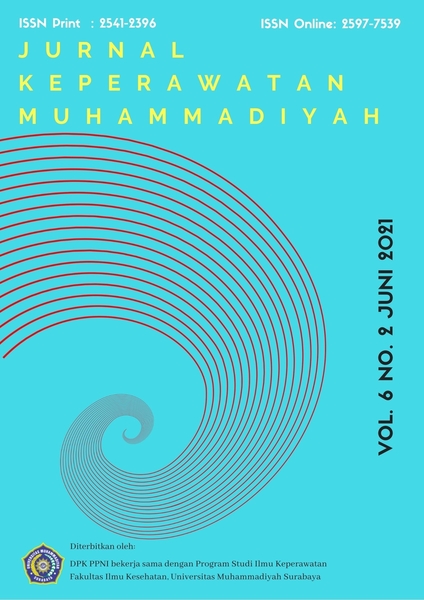Dampak Hospitalisasi Pada Anak Dengan Typhoid Fever: Studi Kasus
DOI:
https://doi.org/10.30651/jkm.v6i2.7821Keywords:
hospitalization, children, typhoid feverAbstract
Disease and hospitalization can be the crisis that a child encounters. Â Typhoid fever is an acute infectious disease of the digestive tract caused by Salmonella Typhi.
Objective: Â The aim of this study was to identify the impact of hospitalization on children with typhoid fever.
Methods: Â This research usea qualitative research with a case study approach. This research is a case study of nursing care for children with typhoid fever in the Cempaka Room, RSUD dr. Mohammad Zyn of Sampang Regency. Respondents in this case study were 2 children with Typhoid Fever.
Results: The results of the study obtained the results from the objective data that the two children felt afraid and strange in the hospital. The subjective data shows that the parents of both children said they were worried about their child's condition. Parents and children experienced anxiety when the child was hospitalized.
Conclusion: The impact of hospitalization for children causes fear, anxiety, due to unfamiliar environmental conditions and the treatment process by health workers. Meanwhile, the impact of hospitalization on parents can cause anxiety about the condition and development of their child's disease.
References
Bowden, B.R., & Greenberg, C.M. (2010). Children and their families: Continuum of care. Second edition. Philadephia: Lippincott Willian & Wilkins.
Bsiri-Moghaddam, K., Basiri-Moghaddam, M., Sadeghmoghaddam, L., & Ahmadi, F. (2011). The concept of hospitalization of children from the view point of parents and children. Iranian Journal of Pediatrics, 21(2), 201–208.
Chodidjah, S., & Syahreni, E. (2015). Pengalaman Hospitalisasi Anak Usia Sekolah. Jurnal Keperawatan Indonesia, 18(1), 45–50. https://doi.org/10.7454/jki.v18i1.397
James, S.R. & Ashwill, J.W. (2007). Nursing Care of Children : Principles and Practice. Third edition. Mosby: Evolve Elsevier
Nurfatimah, N. (2019). Peran Serta Orang Tua dan Dampak Hospitalisasi pada Anak Usia 3-6 Tahun di Ruang Anak RSUD Poso. Jurnal Bidan Cerdas (JBC), 2(2), 77. https://doi.org/10.33860/jbc.v2i2.187
Supartini, Y. (2010). Buku Ajar Konsep Dasar Keperawatan Anak. Jakarta: EGC
Taqiyah, Y., Studi, P., Keperawatan, I., Kesehatan, F., Indonesia, U. M., & Prasekolah, A. U. (2020). Hubungan Family Centered Care Dengan Dampak. 4(2), 80–89.
Utami, Y. (2014). Dampak Hospitalisasi Terhadap Perkembangan Anak. Jurnal Ilmiah WIDYA, 2(2), 9–20. http://digilib.mercubuana.ac.id/manager/t!@file_artikel_abstrak/Isi_Artikel_891255124583.pdf
Winarsih, B. D. (2014). Dampak hospitalisai pada anak prasekolah berdasarkan pengalaman anak dirawat dan pengalaman merawat anak oleh orang tua di RSUD RA Kartini Jepara. 2(9), 15–20. http://jurnal.stikescendekiautamakudus.ac.id/index.php/stikes/article/view/39/54
Wong, Donna L. (2009). Buku ajar keperawatan pedriatrik volume 1 edisi 6. Jakarta: EGC
Downloads
Published
Issue
Section
License
- Penulis tetap memegang hak atas karyanya dan memberikan hak publikasi pertama kepada jurnal ini yang secara simultan karya tersebut dilisensikan di bawah:Â Creative Commons Attribution-ShareAlike 4.0 International (CC BY-SA 4.0)













